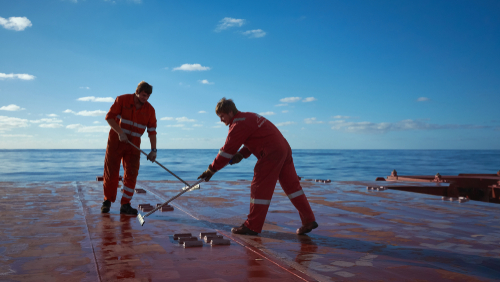It is a matter of fact that the COVID-19 pandemic has changed our lives in several dimensions. However, within shipping industry it is observed that seafarers’ work, mental health and life on board have been hit hard by the outbreak.
In fact, due to the crew change crisis and with crewmembers being stranded onboard for months, there is an increase in workload in comparison to their workload prior to the pandemic.
Although the demanding nature of shipping means that seafarers may be required to work long and irregular hours or spend an extended period of time working and living away from home, the pandemic has negatively affected the overall situation.
In light of the above, World Maritime University conducted a survey in order to examine the impact of the pandemic on seafarers’ work and wellness on board.
Seafarers were asked how the COVID-19 pandemic affected different aspects of work and life on board, their family and their employment. Overall, the responses suggest serious impacts of the pandemic, with over 20% of respondents reporting a very high or high impact in each of these areas.
…WMU said.
Specifically, WMU revealed that around half of the seafarers reported an increase in their workload (47.8%) and that of their crew (48.2%).
What is more, around half reported that their workload had remained “about the same” (self: 46.6%, crew: 44.7%) since the start of the pandemic. At the same time only a small group of respondents indicated that they experienced a decrease in their workload (5.2%) or that of their crew (6.6%).
By far the most seriously affected area, according to survey responses, were crew changes, followed by ship-shore interactions. As a result of the crew changeover crisis, several seafarers are serving well beyond their contractual terms and have to take on additional tasks.
[smlsubform prepend=”GET THE SAFETY4SEA IN YOUR INBOX!” showname=false emailtxt=”” emailholder=”Enter your email address” showsubmit=true submittxt=”Submit” jsthanks=false thankyou=”Thank you for subscribing to our mailing list”]
Imbalance between workload and manning levels indicate that flag States do not always fulfill responsibilities, nor do they ensure that shipowners carry out theirs with due regard to efficient and sufficient manning levels on board ships.
“Given the growing power imbalance caused by the crew change crisis, crew are under enormous pressure to appease their employers, who are often a seafarer’s only way off a ship after months at sea. While most employers will expect crew to pick up these remote inspection tasks on top of their already overburdened workload, often when a seafarer is supposed to be keeping watch for everyone’s safety.”... ITF’s Maritime Safety Committee said.
As WMU further explained, under such circumstances requirements for reporting work/rest hours are seen, by seafarers, as merely a paper exercise.
In addition, Seafarers Hapiness Index by The Seafarers Mission revealed that crewmembers’ rest hours are not being complied with. A few respondents spoke of an endemic and systematic culture of fraud, and that pressures to make things appear compliant are coming at the expense of seafarers’ wellbeing.
Crew repeatedly and consistently spoke of pressures to sign against working hours which do not reflect what they had actually worked. Indeed, there was criticism of shore managers as they are deemed to be “primarily concerned regarding paper trail for audit versus actual conditions of the work required”, the Index stated.
Aside from concern over hours, the jobs themselves and the tasks being completed also take a heavy toll. The impact of long working hours combined with intense concentration and responsibility were a toxic mix for many.
We work more than we ought to. We work 14 to 15 hours every day. And they force us to sign a monthly working slip which complies with working hours.
…as one seafarer told in the Seafarers Happiness Index.
Among others, crew are being expected to perform extra duties, due to the fact that some of the tasks which are normally performed by specialists e.g. stevedores and port officials etc., are no longer possible due to quarantine related restrictions.
“Hundreds of thousands of seafarers are impacted through being trapped on ships, and are often forced to work beyond the default 11-month maximum period of service on board, derived from the ILO’s Maritime Labour Convention, 2006, (MLC, 2006). This is increasingly resulting in situations which could amount to forced labour”... as ILO stated.
To remind, the MLC, 2006 establishes the terms and conditions for employment for every seafarer employed on a ship to which the Convention applies. Specifically, the maximum period a seafarer is expected to serve on board before being entitled to repatriation at the shipowner’s expense is 11 months. When the contract expires, even if this is before 11 months he can request to be repatriated.
Under the Convention each Member shall ensure that the hours of work or hours of rest for seafarers are regulated and establish maximum hours of work or minimum hours of rest over given periods that are consistent with the provisions in the Code.
However, with such workload that seafarers are currently dealing with, Britannia P&I Club urged that there are required additional risk assessments, with appropriate management oversight, as well as new procedures and safe working practice guidelines.
The current global crisis is a people issue – our people. It is essential that we all work together to ensure that seafarers are not neglected or forgotten about, and that they are treated as key workers. Everything possible should be done to ensure the health and wellbeing of seafarers currently on board and, when possible, to facilitate necessary changes of crew to keep the world’s supply lines open.
…CHIRP Maritime concluded.






























































